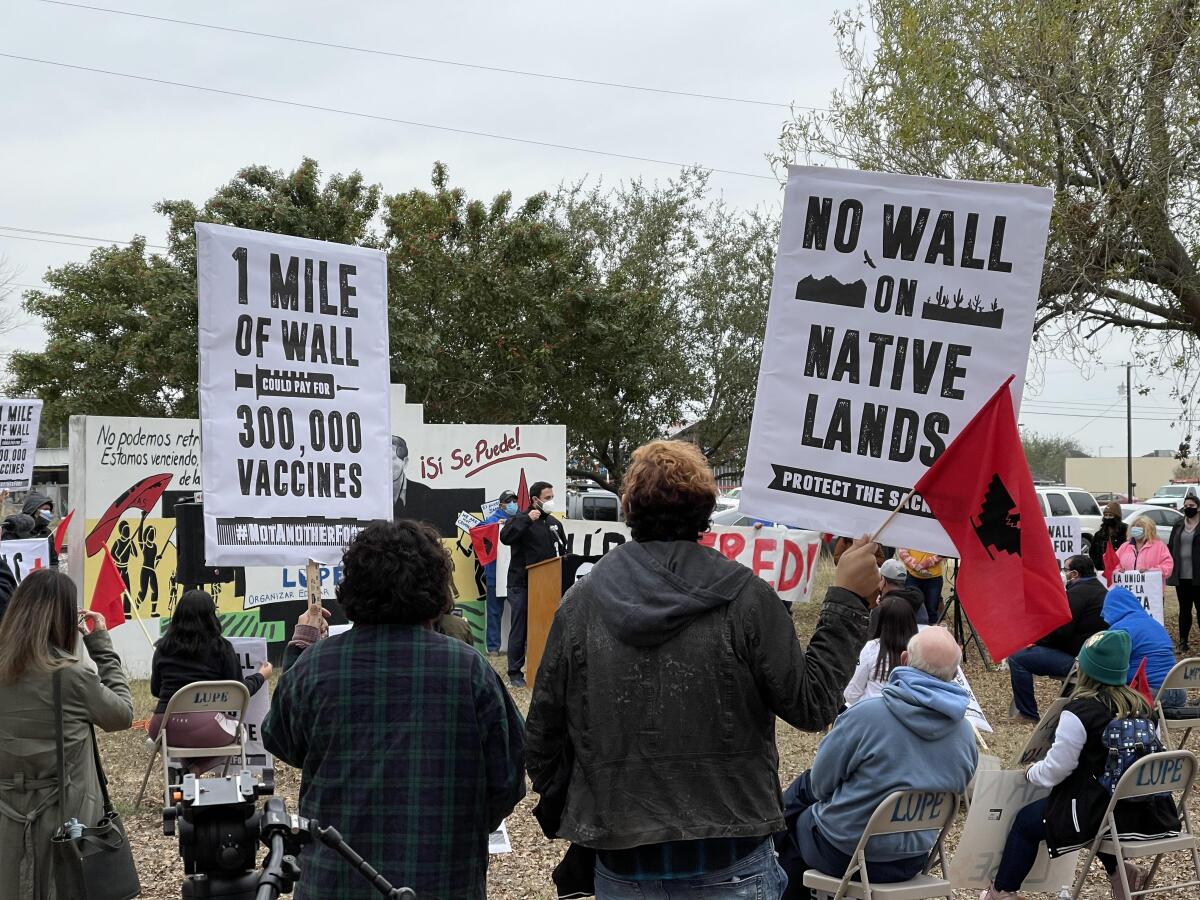Latinx Files: When the circus came to Alamo, Texas, no one noticed

- Share via
In last week’s edition of the newsletter, I mentioned that we’d be focusing on the future and what that might look like for Latinxs. Unfortunately, in light of last Wednesday’s insurrection by Trump supporters trying to prevent the certification of Joe Biden’s electoral victory, the future will have to wait.
As Congress impeached the president for the second time and Republicans distanced themselves from him, President Trump came out of hiding and headed to Alamo, Texas, in the Rio Grande Valley, on Tuesday to tout what he considers a great accomplishment: the construction of a wall along the U.S.-Mexico border.
It was an odd place to visit. For locals, the predominantly Mexican American town of roughly 20,000 people is synonymous with the Mercadome Flea Market and Alamo Dance Hall, the largest swap meet in the Rio Grande Valley and a popular music venue. For outsiders, it’s known — if at all — for its birds, both literally and figuratively. The Santa Ana National Wildlife Refuge, whose 2,088 acres sit in the city’s southernmost region along the Rio Grande, is a haven for migratory birds. Likewise, Alamo is a popular destination for “snowbirds,” predominantly white retirees from colder climates looking for an affordable place to wait out the winter months.

Ostensibly, Trump picked Alamo because that’s where the 450th mile of barrier built under his administration is located — though it’s worth noting that the vast majority of that mileage comes from repairs or replacement of previously existing wall, according to a recent report by U.S. Customs and Border Protection.
For some historians, however, that Trump should head to a border town named after the mission located more than 230 miles away made famous by Texas’ independence felt intentional. Texas, after all, is the only state in the Union to have fought in a war in defense of slavery twice.
The Alamo has become “in some ways a sort of symbol of Anglo-Saxon preeminence,” Walter L. Buenger, Texas State Historical Assn. chair, told USA Today. “The Alamo became this symbol of what it meant to be white.”
The Latinx experience chronicled
Get the Latinx Files newsletter for stories that capture the multitudes within our communities.
You may occasionally receive promotional content from the Los Angeles Times.
As Trump’s trip loomed closer, so did the specter of possible political violence. Local organizers worried that organizing a protest near where Trump was supposed to speak would result in bloodshed — not an unfounded fear given that five people died in last week’s siege of the Capitol and that several prominent lawmakers, including Rep. Alexandria Ocasio-Cortez, have since said they feared for their lives during it.
“At this point in time, we cannot in good conscience encourage community members to approach violent white supremacists who have no sense of what is right, what is moral, or what is the right side of history,” La Union del Pueblo Entero (LUPE), a pro-immigrant grassroots group, said of its decision to hold a rally, where former Housing and Urban Development Secretary Julián Castro spoke at its headquarters, about 8 miles from the stage set up for Trump.
“Anytime he’s been in political hot water,” Castro said of Trump, “he’s gone back to the red meat of immigration policy and stirring up hate.
“And that’s what he’s done this time, just a few days after the entire world saw him incite an insurrection to make him the most shameful, the most ignominious president in the country’s history. He goes right back to scapegoating and demonizing and otherizing those brown people.”
In the end, however, Trump’s visit to the Rio Grande Valley came and went with very little fanfare. Though hundreds of his supporters gathered outside the Valley International Airport in Harlingen, Texas, to greet him, and dozens more in McAllen, Texas, nothing really happened.
The pro-Trump crowd wasn’t even the largest gathering in the Rio Grande Valley this week. That honor goes to the thousands of people who headed to the Bert Ogden Arena in nearby Edinburg, Texas, in hopes of getting the COVID-19 vaccine.
Consider subscribing to the Los Angeles Times
Your support helps us deliver the news that matters most. Become a subscriber.
Drink beer (if you’re 21-plus) for a good cause
Hot take: Beer is delicious. It’s even better when it’s consumed in the name of philanthropy.
Back in September, Brewjeria Company, Norwalk Brew House and South Central Brewing Company — all Latinx-owned independent brewers based in Southern California — teamed up to make “Los Vendors,” a collaboration beer whose proceeds went in part to help out local street vendors facing economic hardship because of the pandemic. It sold out within 24 hours and raised $1,500, said Norwalk Brew House owner Ray Ricky Rivera — money which was given out in the form of cash and grocery store gift cards.
The cerveceros are at it again. On Friday, they’re releasing “Los Car Washeros,” a pineapple-mango wheat ale aimed at helping carwash workers.
“As Latinos doing business in the communities we’re from, we feel a responsibility to not just make beer for the bottom line, but to do everything we can to leverage our position to give back, to support our people,” said Rivera. The group hopes to raise even more money this time around and is planning to make a third beer to help out mariachis.
In the meantime, you can order “Los Car Washeros” here when it becomes available.
Things we’ve read this week that we think you should read
— In California, anyone 65 or older is now eligible to receive the COVID-19 vaccine, Gov. Gavin Newsom announced Wednesday. Getting as many people vaccinated as possible is of the utmost importance if we want to return to some semblance of normalcy, so please convince your abuelitos, abuelitas, tíos, tías, moms and dads to take the shot.
— Last week’s riot and insurrection perpetrated by Trump supporters who refused to accept the results of a legitimate election was a dark day for America. It was difficult to witness as an American, and for Mauricio Martinez (no relation), it was troubling to watch as an immigrant.
— Erendira Guerrero, a woman from Juárez, Mexico, is helping El Pasoans and Juarenses who have lost a loved one to COVID-19 find closure by taking a shirt that used to belong to the deceased and making a teddy bear out of it. What really made this story stick with me was the photography.
— The house featured in Alfonso Cuarón’s Oscar-winning film “Roma” is up for sale. “Life goes on,” Adriana Monreal told the Guardian of her family’s decision to sell a home that has housed four generations. There’s no listing price available, but a comparable property in the same neighborhood was going for around $750,000.
— And speaking of the Guardian, the news outlet is reporting that Argentina is planning to drop all charges against women who have had abortions after the country recently legalized it.
— Juan Ricardo Gomez, a journalism student at Cal State Los Angeles (go Golden Eagles!), wrote about his experience of being a Mexican immigrant and attending high school in Temecula, Calif., for the school paper. In his essay, Gomez speaks of alienation and being reduced to stereotypes, something that clearly struck a chord with his readers: The comments section is filled with people talking about their personal experiences dealing with the same thing. (Important side note: If you’re a journalism professor or a student journalist, feel free to email me links to your work at latinxfiles@latimes.com to feature in this section.)
— Want to feel old? TikTok user Fernanda Cortez posted this clip of a list of Spanish-language songs that are turning 20 this year. Adding to that feeling is the fact that I came across this video on Twitter, where all the popular TikTok content goes for syndication. Shoutout to Gen senior writer Andrea González-Ramírez for blessing my timeline with this reminder of my mortality.
The best thing on the Latinternet this week: Hustlers gonna hustle
It’s not lost on me that the tone of this week’s edition of the Latinx Files has been somber. So, as a palate cleanser, I’d like to leave you with the story of Efrain Gonzalez. The 53-year-old Puebla native went viral after a Twitter user posted a video of a news report that showed Gonzalez, known as “Don Efra,” selling bacon-wrapped hot dogs outside Los Angeles City Hall during a pro-Trump rally. I’m linking to it here instead of embedding it because of language.
Hot dog vendors are an L.A. staple. If you’ve ever been to a large gathering in this city — a concert, a ballgame, a bar crawl, a protest — you’d better believe you’ll come across the smell of onions and tubular meats being cooked on a makeshift grill. Come to think of it, it’s one of the things I miss the most from the before times.
The homies at L.A. Taco tracked down Gonzalez and spoke to his daughter, who has set up a GoFundMe page in case you’re feeling generous.
The Latinx experience chronicled
Get the Latinx Files newsletter for stories that capture the multitudes within our communities.
You may occasionally receive promotional content from the Los Angeles Times.




